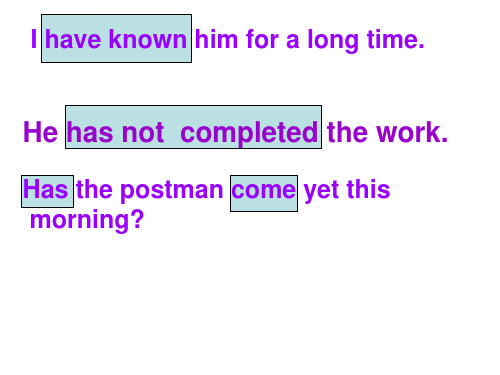现在完成时——英语公开课
高中英语语法present_perfect_tense现在完成时态优秀公开课课件

现在完成时表示动作发生在 过去并且已,经但完对成现
在
仍有影。响通或常产与生副后词果
alread等y,y状et语连用。
Summary:
现在完成时用法1--- 已完成、影响性用法
Thesire I _h_a_v_e__s_p_o_k_e_n__ with the tongue of angels I __h_a_v_e__h_e_l_d___ the hand of a devil
It was warm in the night
• 4.We have studied English for about four years.
• 5.We have lived in Liji Middle School since 2007.
• 6.I haven’t seen Mary so far.
• 7.I have heard nothing from him up to now.
• 11.The price has increased recently, but I doubt whether it will remain so.
• 12.Have you talked to her lately? • 13.It’s been terribly hot these few days. • 14.He has been there ever since you left.
• 8.Until now, the Americans have been playing a very delicate political game.
现在完成时态课件公开课

• I’ve lived here for ten years. 我在这里住了10年。 (现在仍住这儿)
I have finished my homework. I have not finished my homework. Have you finished your homework? Yes, I have./No, I haven’t.
She has been to Europe. She hasn’t been to Europe. Has she been to Europe? Yes, she has./No, she hasn’t.
注3):短暂性动词不能和for或since引 导的时间状语连用,也不能用于how long问句中。
(误)I have left for 5 years. (正)I have been away for 5 years.
短暂性(短动词)动词不能和表示一段时间的时间状语连用,但是 他可以转换成相应的延续性(长动词)动词.
含义及用法:
2. 表示一个从过去开始,一直持 续到现在的动作或状态。
通常和for或since引导的时间状语 连用。 注1):要使用延续性动词
(1)for + 一段时间
I have been here for 5 weeks. He’s studied English for 3 years. She has worked for 10 hours.
字母后+-ed 。
drop---dropped--dropped 2 、不规则动词,见不规则表(p104)
现在完成时公开课课件

REPORT
CATALOG
DATE
ANALYSIS
SUMMAR Y
04
现在完成时与一般过去 时的区别
时间上的区别
总结词
现在完成时与一般过去时在时间上有 明显区别。
详细描述
现在完成时表示动作发生在过去,但 与现在存在关联,强调对现在的影响 或结果。而一般过去时仅表示动作发 生在过去,与现在没有直接关联。
DATE
ANALYSIS
SUMMAR Y
01
现在完成时的定义和构 成
定义
总结词
现在完成时是英语语法中的一种时态,表示某个动作已经发生,并对现在产生 影响或结果。
详细描述
现在完成时是用来描述过去发生的动作或状态,但这个动作或状态与现在的情 况有直接关系。它常常与一些时间状语连用,如"already"(已经)、"yet"(还 )、"just"(刚刚)等。
总结词
强调动作或状态从过去到现在一直持续 发生或存在。
VS
详细描述
现在完成时可以用来表示某个动作或状态 从过去某个时间点一直持续到现在,强调 时间的延续性。这种用法常用于描述习惯 、经历或历史事件。例如,“He has lived in this city for ten years”(他在 这个城市住了十年)。
REPORT
CATALOG
DATE
ANALYSIS
SUMMARY
现在完成时公开课课 件
目录
CONTENTS
• 现在完成时的定义和构成 • 现在完成时的基本用法 • 现在完成时的特殊用法 • 现在完成时与一般过去时的区别 • 现在完成时的常见错误 • 现在完成时的练习与巩固
现在完成时公开课ppt课件

规则动词
• (1)一般动词,在词尾直接加“ ed ”。
• work---worked---worked ,visit---visited---visited
• (2)以“ e ”结尾的动词,只在词尾加“ d ”。
•
live---lived---lived
• (3)以“辅音字母 + y ”结尾的动词,将 "y" 变为 "i" ,再加 “ ed ”。
Revision of the Present Perfect Tense
现在完成时专讲
1
复习目录
• 现在完成时态的概念 • 现在完成时态的结构 • 现在完成时态的否定,疑问形式 • 现在完成时态的用法 • 现在完成时态与一般过去式的比较 • 现在完成时态练习
2
冬天来了,春天还会远吗?
If winter has already come, can spring be far behind?
3
1.现在完成时的概念
1)表示过去发生或已完成的动作对现在造成的影 响或结果;
2) 表示过去已经开始并一直持续到现在的动作或 状态。
E.g. He has learned English since 2001.
现在完成时
past 一般过去式
now 现在进行时
future 一般将来时
4
一. 结构 1.肯定句: have / has + p.p.(过去分词) 2.否定句: have/has + not + p.p.(过去分词) 3.一般疑问句: Have / Has 提到句首 Yes, … have / has. No, … haven't /hasn’t.
九年级仁爱版英语上Unit-1-现在完成时态省公开课获奖课件说课比赛一等奖课件

注意:already用于 肯定 句; yet 用于 否定/疑问 句句尾
Exercises
▪ 1. I h__a_v_e_h_a_d_(have) lunch already. ▪ 2. Has the train_a_r_r_iv_e_d_ (arrive), yet? ▪ 3.Tom _h_a_s_ never__b_e_e_n_t_o(be to ) China. ▪ 4. The twin __h_a_s__just _s_e_e_n_(see) my
▪ have/has been in/at:呆在某地(表达某人 “已在某地停留一段时间,现仍在那里”, 其后常带表达一段时间旳状语)。
Exercises
▪ Tom 在哪儿? 他去书店买书了。 -Where is Tom?
-He has gone to the bookshop to buy some books. ▪ 我在北京待了5年了。
几种?
(1)、一般动词,在词尾直接加“ ed ”。 work---worked---worked visit---visited---visited
(2)、以“ e ”结尾旳动词,只在词尾加 “ d ”。
live---lived
(3)、以“辅音字母 + y ”结尾旳动词,将 “y” 变为 “i”,
▪ 用since或者for填空
▪ 1. My brother has worked in this shool ___s_in_c_e_ 2023.
▪ 2. The Germans have lived in the city ___fo_r__ ten yeas.
▪ 3. I have had this book _s_in_c_e__ two days ago.
2024版现在完成时公开课学习课件

习课件•课程介绍与目标•现在完成时的基本结构•现在完成时的用法•现在完成时与其他时态的对比目录•现在完成时的常见错误及纠正•现在完成时的练习与巩固课程介绍与目标现在完成时的定义及重要性定义重要性课程目标与学习内容课程目标学习内容本课程将详细介绍现在完成时的构成、用法、常见错误及与其他时态的区别等。
教学方法与安排教学方法课程安排现在完成时的基本结构have/has+过去分词的基本形式0102肯定句否定句疑问句030201肯定句、否定句和疑问句的构成缩写形式及读音规则缩写形式01读音规则02注意03现在完成时的用法表示过去发生的动作对现在造成的影响或结果现在完成时可以用来表达过去发生的动作对现在产生的结果或影响,强调与现在的联系。
例如,“I have lost my keys.”(我把钥匙丢了。
)这句话表明了过去丢钥匙的动作对现在造成的影响,即我现在没有钥匙。
这种用法通常与表示变化或状态的动词连用,如“become”、“get”、“go”、“turn”等。
例如,“The leaves have turned yellow.”(叶子变黄了。
)这句话描述了叶子过去变黄的过程,并强调了现在叶子呈现出的黄色状态。
表示过去发生的动作持续到现在,甚至可能继续下去现在完成时还可以用来表示从过去某个时间点开始一直持续到现在,甚至可能继续下去的动作。
例如,“I have studied English for five years.”(我已经学了五年英语。
)这句话表明了我从过去某个时间点开始学英语,一直持续到现在,并且还可能继续学下去。
这种用法通常与表示持续时间的状语连用,如“for + 时间段”、“since + 时间点”等。
同时,也可以使用一些表示持续性的动词,如“live”、“work”、“study”等。
与时间状语连用表示动作的完成或经验的积累现在完成时与其他时态的对比动词形式时间点与时段一般过去时使用动词的过去式,而现在完成时则使用“have/has +过去分词”的形式。
现在完成时讲解课件

现在完成时的基本句型:
肯定式:主语 + 助动词have/has + 动词的过去分词. 疑问式:助动词Have/Has + 主语 + 动词的过去分词? 否定式: 主语 + 助动词have/has + not + 动词的过去分词.
例句:
6. Has he gone to the library ? 他是去了图书馆吗? Yes ,he has. 是的,是去那里了。 No, he hasn’t. 不,他没去那里。
Eg. I have been here since 2000. I have been here since 5 years ago. I have been here since I graduated in 2000.
since , for 的用法:
since: (自…以来)
1)since+时间点 He has stayed here since 5 o’clock. 2)since+ 时间段+ ago He has stayed here since 5 hours ago. 3)since+ 从句 She has taught English since he came here.
现在完成时
现在完成时 ( present perfect tense)
past
present(now)
future
do my homework
现在完成时的构成
have (has)+ 过去分词
上一页
主菜单
下一页
Mother: John, clean your teeth please. John: Mum, I have already(已经) cleaned them.
现在完成时态公开课ppt课件

Form: have/has + done Negative form: have/has not done Question form: Have/Has +主语+done
No Image
严格执行突发事件上报制度、校外活 动报批 制度等 相关规 章制度 。做到 及时发 现、制 止、汇 报并处 理各类 违纪行 为或突 发事件 。
现在完成时 PK 一般过去时:
• 现在完成时: 强调动作对现在产生了结
果和影响.
2.一般过去时: 只表示过去的动作和状态.
强调动作. 若有时间状语:yesterday, last week,…ago, in1980, in October,
justNo Image
now,用一般过去时
严格执行突发事件上报制度、校外活 动报批 制度等 相关规 章制度 。做到 及时发 现、制 止、汇 报并处 理各类 违纪行 为或突 发事件 。
严格执行突发事件上报制度、校外活 动报批 制度等 相关规 章制度 。做到 及时发 现、制 止、汇 报并处 理各类 违纪行 为或突 发事件 。
Summary (4):
我们用现在完成时表示反复发生的动作。
• You don't need to describe her. I ___ her several times.
• While we have not dismissed the idea, we are looking into other possibility as well.
严格执行突发事件上报制度、校外活 动报批 制度等 相关规 章制度 。做到 及时发 现、制 止、汇 报并处 理各类 违纪行 为或突 发事件 。
人教版初中英语现在完成时知识讲解公开课ppt课件

3.
— Has Tom left our town? — Yes, he has.
— And how long has he been away?
— About two hours.
疑问句:(疑问词)Have/Has + 主语 + 过去分词?
Time Expressions with Present Perfect Tense 现在完成时常用的时间短语
4 John Martin: Oh, look at that huge apartment block! Xiao Li: Yes, they have just completed it.
Conclusion:现在完成时表示一个到现在时间为止已
经完成了的、对现在有影响的动作或状态。(现在完成 时的已完成用法)
Conclusion: 现在完成时未完成用法往往同包含现在时间 在内的时间状语连用, 如so far, up to now, till now, all one’s life等。
Time Expressions with Present Perfect Tense 现在完成时常用的时间短语
1 We have often been there. 2 I have sometimes had letters from him.
2 Up to now, I’ve understood everything the teacher’s said.
3 We’ve had very good weather this winter, till now.
4 Am I right in thinking that you've lived here all your life?
现在完成时公开课(新)

• already(已经) (用于肯定句,可放在句中或句末。)
I have already opened the door.
I have opened the door already. • yet(仍然,还没有) (用于否定句或一般疑问句,放句末。)
Yes, I have. No, I haven’t.
we, travel by plane
We have travelled by plane. 否定句: We have not travelled by plane. 一般疑问句: Have you travelled by plane?
肯定/否定回答:Yes, we have. /No, we haven’t.
He has had breakfast before. He/she is not hungry now.
I have had breakfast. I haven’t had breakfast. Have you had breakfast? Yes, I have. No, I haven’t.
finish the picture he, not, yet
He has not finished the picture yet.
swim they, not, yet
They have not swum yet.
learn English she, never She has never learnt English.
finish her homework
She has finished her homework. 否定句:She hasn’t finished her homework.
《现在完成时》课件

05
CATALOGUE
现在完成时的练习与巩固
选择题练习
总结词
考察对现在完成时的理解
详细描述
设计多个选择题,选项中包括现在完成时的正确形式和常见的错误形式,让学生通过选择题练习加深 对现在完成时的理解。
填空题练习
总结词
检验对现在完成时的掌握程度
详细描述
提供句子,让学生填写正确的现在完 成时态,通过填空题练习,让学生在 实际运用中掌握现在完成时的正确形 式。
翻译练习
总结词
提升对现在完成时的运用能力
详细描述
选取一些中文句子,要求学生将其翻译成英文,并确保使用 正确的现在完成时态。通过翻译练习,让学生在实际语境中 运用现在完成时,提高语言运用能力。
THANKS
感谢观看
混淆现在完成时和一般现在时
总结词
两者都表示现在的状态或动作,但意义不同。
详细描述
现在完成时表示某个动作已经完成并对现在有影响,而一般现在时只是描述现在 的情况或习惯性的动作。例如,“I have finished my homework”表示作业已 经完成,而“I finish my homework every day”只是表示每天的作业习惯。
结构
have/has + 过去分词
用法
描述过去发生的动作对现在的影响或结果,强调 动作的完成和现在的状态。
现在完成时的基本结构
基本结构
主语 + have/has + 过去分词 + 其他成分
注意事项
过去分词的形式必须与主成时的时态标志
时态标志
have/has + 过去分词
例子
新概念2_lesson28_现在完成时(公开课)ppt

New words
adj. 罕见的, 稀薄的,三分熟 adj. 古代的,古老的 n. 神话故事 n. 麻烦 vt. 麻烦;使烦恼 effect n. 结果,效果 Medusa n. 美杜莎(古希腊神话中3位蛇发女怪之 一) Gorgon n. (古希腊神话中的)3位蛇发女怪之一 (凡见其貌者都会变成石头) rare ancient myth trouble
Waiter: How would you like your steak (to be cooked)? I prefer/would like……
steak [steik] n. 牛排 牛排几分熟: well done : 全熟
•
Well done!【口语】干得漂亮
medium well: 七分 medium : 半生半熟的 五分 adj.中间的, 中等的, 半生熟的 medium rare: 四分 rare : 几乎生的,三分熟(西冷牛排)
• none 可指人也可指物,作主语时,如和 of 连用指不 可数名词时,谓语动词要用单数形式;指可数名词时, 谓语动词用单、复数均可。如: • No one likes smoking . Nothing is difficult in the world if you put your heart into it. None of them has / have a car. None of this money is mine.
练习2
按要求改写下列句子:
1) We have visited the museum. (改为一般疑问句) 2) They have seen the film. 3) He has returned the book. (改为否定句) (对划线部分提问)
M2U1语法---现在完成时与现在完成进行时-公开课课件

现在完成进行时与现在完成时的区别如下:
1.现在完成时与现在完成进行时
I have written an article. 强调: 已完成性
I have been writing an article. 强调:持续性, 尚未完成
2.有些延续性动词,如live, teach, work, study, learn, stay等因现在
• She has had a good education. 她受到过良好的 教育。(影响是她文化水平高,有修养)
第5页,共36页。
2.从过去持续到现在的动作(延续性动词或表状态的形
容词)
现在
time
时间段:
since/so far:从过去到现在 in the past/few years:从过去到现在的几年
B. had come C. were coming D. have been coming
第24页,共36页。
Adventures
2. —I have got a headache.
—No wonder. You ________in front of that computer too long. A. work B. are working C. have been working
• 2.自从上周五晚我就没有看到贾斯丁。
I have not seen Justin since last Friday night.
• 3.该事件引起了公众的极大兴趣,原因是…. • This incident has received great interest
due to reports of alien visits… Present perfect tense
初中九年级英语《现在完成时》复习公开课PPT课件

QUIZ:
1.Great changes _h_a_v_e_ta_k_e_n_ (take) place in__t_h_e_p_a_s_t__fe_w___y_e_a_rs.
2He _h_as___g_o_n_e_(go) to Beijing. He _w__i_l_l_c_o__m__e__b_a_c__k__to__m__o_r_r_o__w.
Review & take notes 复习背记并整理笔记
前情回顾:现在完成时小结 助动词have/ has + done
(一)表示过去发生的动作或已完成的动作对现在造成的影响。 时间状语 just;already; yet ; ever ; never; recently,
lately, before, twice, …
(二)表示过去发生的动作一直持续到现在,有可能继续下去. (延续性动词)
1 -- Where is Jack? -- He _h_a_s_g_o_n_e_t_o the park.
2 -- __H_a_v_eyou_e_v_er b_e_e_n__t_o_ Paris? -- No, I _h_a_v_e_ never _b_e_e_n__ t_h_e_r_e_.
3 Mary _h_a_s_b_e_e_n__in_ Shanghai _si_n_c_e five years ago.
3My parents _m_a_r_r_ie_d__(marry) in__2_0_0_0_, theyh_a_v_e_b_e_e_n__m_a_r_ri_e_d(marry) fo_r _tw__e_n_ty__y_e_ar_s.
4We _h_a_v_e__p_l_a_n_te_d__(plant) two thousand trees _s_o_f_a_r_.
2014现在完成时讲解课件(九年级)公开课

解析
这句话表示“到目前为止还没 有写完”,所以用现在完成时
。
翻译题练习
01
02
03
04
翻译题1
他们还没有决定去哪儿度假。 (They haven't decided
where to go for vacation.)
解析
这句话表示“到目前为止还没 有决定”,所以用现在完成时
。
翻译题2
她还没有写完那篇论文。 (She hasn’t finished writing that paper.)
答案
has not finished
解析
yet用于否定句中,表示“还没有”,所以用现在完成 时。
填空题练习
填空题1
I ____(not read) the book yet. I ____ (read) it last month.
01
解析
第一空表示“到目前为止还没有读过 ”,所以用现在完成时;第二空表示 “上个月读了”,所以用一般过去时
时间状语的区别
"in 2013"
"between 2010 and 2015"
语义的区别
现在完成时
强调动作对现在的影响 或结果。
一般过去时
只强调动作发生在过去 。
例如
I finished my homework yesterday. (只强调写作业的动作发 生在昨天,不涉及现在 。)
06
现在完成时的练习与巩固
05
现在完成时与一般过去时 的比较
时间状语的区别
现在完成时 "already"
时间状语的区别
"just" "yet"
- 1、下载文档前请自行甄别文档内容的完整性,平台不提供额外的编辑、内容补充、找答案等附加服务。
- 2、"仅部分预览"的文档,不可在线预览部分如存在完整性等问题,可反馈申请退款(可完整预览的文档不适用该条件!)。
- 3、如文档侵犯您的权益,请联系客服反馈,我们会尽快为您处理(人工客服工作时间:9:00-18:30)。
现在完成时
Have you ever
_____ you ever ______ somebody so much . It makes you cry. _____ you ever ______ something so bad . You can't sleep at night. _____ you ever ______ to find the words . But they don't come out right . Have you ever, have you ever . _____you ever ______ in love been in love so bad. You'd do anything to make them understand. _____ you ever____ someone steal your heart away. You'd given anything to make them feel the same .
I have taught English for 8 years. I have taught English since 8 years ago. for + 一段时间 I have taught English since 2007. I have taught English since I left school. (表示过去某一时间的)时间点
Have you ever watched Crazy Animals City? Crazy Animals City has shown and my friend Lu Han wanted to watch it with me.
Lu: I’ve arrived in the cinema. : How long have you been in the cinema? Lu: I’ve been here for 10 minutes.
since 4. My friends haven’t visited me ___________ my birthday.
for 5.She hasn’t had a good cup of coffee _______years.
since two years ago. 6. Tom has worn glasses _________
start / begin
(非持续)
be on
(持续)
(2 hours later)
L: Where are you? The movie was over. I have left.
S: I’m on my way. How long have you been away?
L: I have been away since the movie was over.
动作或状态发生在过去,但它的影响现在还存在。 They have left. --他们已经离开了.(也就是说现在他们人不在这里)
也可表示持续到现在的动作或状态。 He has learned English since 2001. --他从2001年开始学英语构成形式
since +
具体时间+ago 从句(一般过去时)
for 15 years. 1. Mr. Brown has had his TV ________ since last month. 2. I’ve taken driving lessons _________
3. Tom has worked in the factory _________ since he left school ten years ago.
肯定句:主语+have/has +过去分词 一般疑问句:Have/Has+主语+过去分词 否定句:主语+have/has +not+过去分词
I have taught at No.44 Middle School for 5 years.
-- How long have you studied at No.56 Middle School? for 2 years. -- I have studied at since 2 years ago. since 2014. this school since I was 13.
Have you ever
_____ Have you ever ______ loved somebody so much . It makes you cry. _____ you ever ______ Have needed something so bad . You can't sleep at night. _____ you ever ______ Have tried to find the words. But they don't come out right. Have you ever, have you ever. _____ you ever ______ been in love Been in love so bad. Have You'd do anything to make them understand. _____ you ever____ Have had someone steal your heart away. You'd given anything to make them feel the same.
arrive
(非持续)
be (in/at)
(持续)
S: Have you bought the tickets?
L: Yes, I have. I have had them for 1 day.
buy
(非持续)
have
(持续)
L: The movie has started. S: How long has the movie been on? L: It has been on for 20 minutes!
